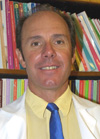|
Peter Kalivas, Ph.D., professor
and co-chair of the Department of
Neurosciences, received the South
Carolina Governor's Award for
Excellence in Scientific Research
while attending the S.C. Academy
of Science Annual Meeting on April
14.
 Dr. Peter Kalivas Dr. Peter Kalivas
Kalivas was
recognized for his scientific
discoveries regarding drug
addiction and serving as an
academic leader and department
chair at MUSC's College of
Medicine for more than a decade.
Kalivas' work contributed to a
significant rise in national
stature as a leading medical
research institution.
"Peter is
highly deserving of this award,
and we are fortunate to have a
scientist of his caliber focused
on translating basic science
discoveries into clinical
interventions for drug addiction,
which is a significant problem for
South Carolina and the nation as a
whole," said MUSC College of
Medicine Dean Etta Pisano, M.D.
"In large part due to Dr. Kalivas'
leadership during the last decade,
South Carolina now harbors one of
the top-tier addiction and
neuroscience research
organizations in the country."
Drug addiction
in South Carolina is estimated to
cost the state $2.5 billion a year
in medical treatment, judicial
system or incarceration and lost
work hours, and in 2005 addiction
was directly responsible for the
death of 21,932 South Carolinians.
Kalivas and a
team of researchers at MUSC
receive approximately $15 million
in research funding from the
National Institutes of Health
(NIH) each year to make basic
scientific discoveries and
translate these findings into
clinical trials for addicts. For
example, his discovery of the role
played by glutamate in addiction
has led to testing new treatments
in cigarette, marijuana, cocaine,
and soon in alcohol addicted
citizens of South Carolina.
Kalivas
received his doctorate in
pharmacology from the University
of Washington in 1980 and
completed postdoctoral studies at
the University of North Carolina
at Chapel Hill in 1982. Following
faculty appointments at Louisiana
State University Medical Center
and Washington State University,
where he served as director of the
Alcohol and Drug Abuse Program, he
joined the MUSC faculty in 1998 as
professor and chair of the
Department of Physiology and
Neuroscience. His publication
record reflects 293 peer-reviewed
papers, serves on many editorial
boards and has received numerous
honors and awards throughout his
career. He also holds a patent,
with another patent pending.
|



 Dr. Peter Kalivas
Dr. Peter Kalivas